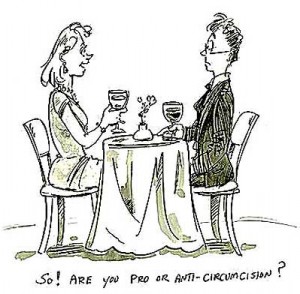Circumcision Benefits: Lesser Risk of Genital Warts Infection? Proponents of male circumcision will have another research data to back up their claim that circumcision is good for your health. According to researchers from Johns Hopkins University in Baltimore, circumcision reduces the risk that a man will infect his woman with the human papilloma virus or HPV.
As you may already know, HPV causes cervical cancer and genital warts.
Says a report written by Dr. Maria Wawer and her colleagues published in the Lancet medical journal:
Our findings indicate that male circumcision should now be accepted as an efficacious intervention for reducing the prevalence and incidence of HPV infections in female partners. However, protection is only partial; the promotion of safe sex practices is also important.
How did the researchers arrive at their conclusion? They went to Rakai, Uganda and monitored HIV-negative men and their female partners from 2003 and 2006.
After two years the researchers found, according to a Reuters report, that “27.8 percent of the steady partners of circumcised men had HPV infections, compared to 38.7 percent of the partners of uncircumcised men”.
Write the researchers: “Male circumcision has now been shown to decrease HIV, herpes simplex virus-2, and HPV infections and genital ulcer disease in men, and also HPV infection, trichomoniasis, and bacterial vaginosis and genital ulcer disease in their female partners. Thus, male circumcision reduces the risk of several sexually transmitted infections in both sexes, and these benefits should guide public health policies for neonatal, adolescent, and adult male circumcision programs.”
So there you go, according to this research, female partners of circumcised men face a lower risk of getting infected with HPV.
***
What we find problematic in this study is that, if we understood the report correctly, the researchers were the ones who had the circumcised men get circumcised precisely for the study.
Could this have encouraged the men to alter their sexual behavior (i.e., had lesser sexual relations outside of their marriage/consensual relationship) and so they had lesser chances of getting infected with HPV and a lesser chance of passing HPV on to their wives/partners.
What do you think? Read the full report by following the link to Lancet. You will have to register to access the full report (registration is free).
Update: We are updating this post to add this comment posted by Hugh7 in the comments section:
Hugh7: Your skepticism is appropriate. Behaviour change is one of many factors that could have influenced this non-double-blinded, non-placebo controlled study.
“A 28 percent higher risk of being infected with HPV” sounds like a lot (expressing it that way magnifies a small difference in rare ailments), but the study actually found circumcision seemed to make a difference of 6.2 HPV infections per hundred person-years. HPV is a common virus that the body is good at ridding itself of. While HPV is almost necessary for cervical cancer, it is very far from sufficient. And they didn’t study cervical cancer at all.
Women weren’t buying circumcision when it was only claimed to protect men from HIV, and a study by this same team started to show that circumcision could INcrease the risk of HIV to women, but (so?) they cut it short before that could be established. This is just part of the same marketting campaign. (In Swaziland they’re using blackmail, with football and pool teams that only circumcised youths can join.)
****
For more on male health, check out our posts on post-partum depression among new fathers, Omega 3 and health sperm cells, and whether stent can treat male impotence.
Circumcision Benefits: Lesser Risk of Genital Warts Infection? Posted 9 January 2011.
